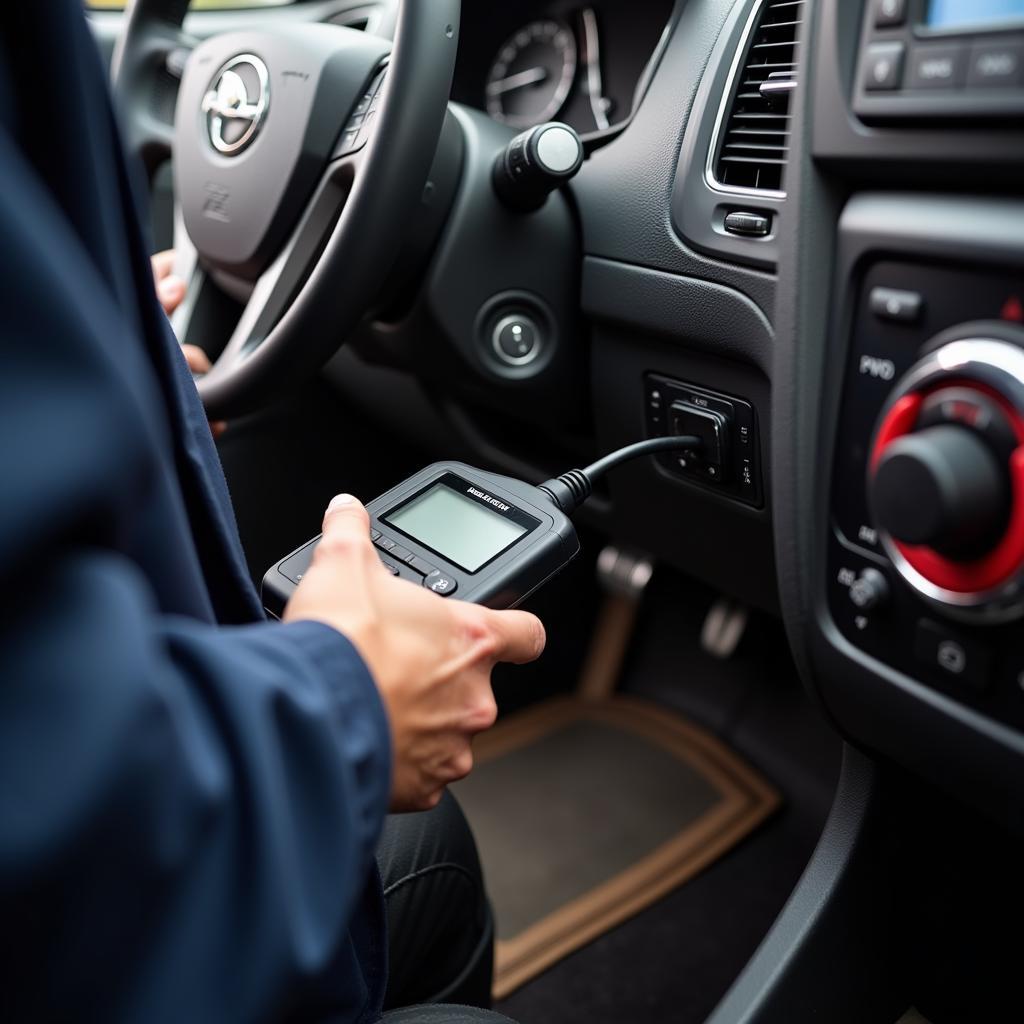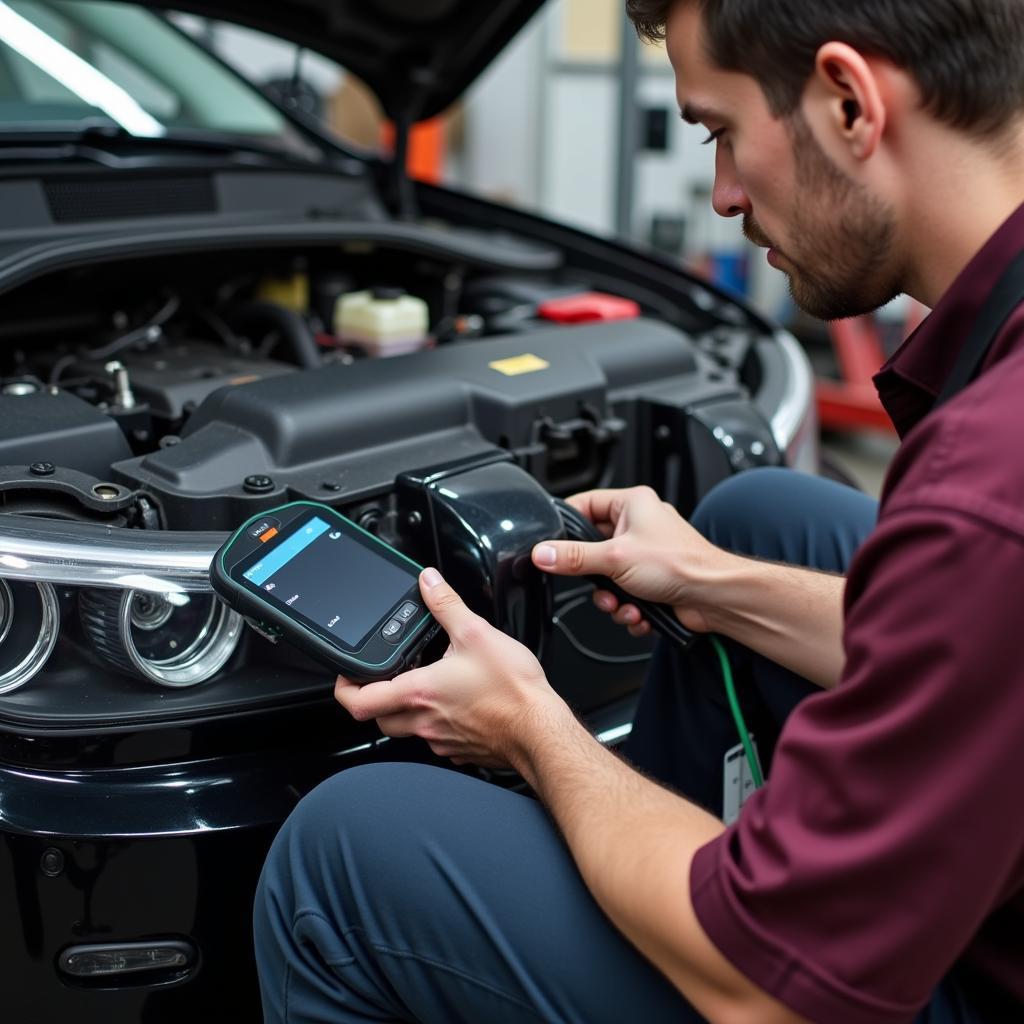Modern vehicles are intricate machines with complex systems, making a reliable Diagnostic Car Scanner Tool indispensable for both car enthusiasts and professional mechanics. These powerful devices act as your window into your vehicle’s computer system, allowing you to understand and diagnose issues with greater accuracy and efficiency.
Understanding the Importance of Diagnostic Car Scanner Tools
 Mechanic using a diagnostic car scanner
Mechanic using a diagnostic car scanner
Gone are the days of relying solely on intuition and experience to troubleshoot car problems. Diagnostic car scanner tools empower you to:
- Retrieve and interpret Diagnostic Trouble Codes (DTCs): These codes, often displayed as a combination of letters and numbers, pinpoint the specific area or system experiencing a malfunction.
- Access live data streams: Monitor real-time parameters like engine RPM, coolant temperature, oxygen sensor readings, and more, providing valuable insights into your vehicle’s performance.
- Perform advanced functions: Depending on the model, some scanners can initiate component tests, reset service lights, program keys, and perform other specialized tasks.
Choosing the Right Diagnostic Car Scanner Tool: A Breakdown
With a plethora of options available, selecting the appropriate diagnostic car scanner tool can seem daunting. Consider the following factors:
- Your Skill Level: Are you a DIY enthusiast or a seasoned mechanic? Entry-level scanners offer basic functionality at affordable prices, while professional-grade tools provide comprehensive features for in-depth diagnostics.
- Vehicle Compatibility: Ensure the scanner supports your vehicle’s make, model, and year. OBD-II scanners are compatible with most vehicles manufactured after 1996. However, some models may require specialized scanners.
- Features and Functionality: Determine the specific features you need, such as live data streaming, bi-directional control, special functions, and software updates.
- Budget: Prices for diagnostic car scanner tools can vary widely. Set a budget beforehand and weigh the features against your needs and financial constraints.
Exploring the Benefits of Using a Diagnostic Car Scanner Tool
 A mechanic using a diagnostic scanner to identify a car issue
A mechanic using a diagnostic scanner to identify a car issue
Investing in a diagnostic car scanner tool offers numerous benefits:
- Save Time and Money: Identify problems quickly and accurately, avoiding unnecessary repairs and costly guesswork.
- Gain Peace of Mind: Knowing you can readily diagnose car troubles provides confidence and reduces stress.
- Empower Yourself: Take control of your vehicle’s maintenance and repairs, reducing reliance on mechanics for minor issues.
- Improve Resale Value: Regular diagnostics and maintenance with a scanner contribute to a well-documented service history, potentially increasing your car’s resale value.
Expert Insights: The Indispensable Tool
“In my 20 years as a mechanic, diagnostic car scanner tools have revolutionized the way we approach car repairs,” says John Miller, a certified automotive technician. “They provide accurate information, save us countless hours of troubleshooting, and empower car owners to better understand their vehicles.”
Navigating the World of Car Diagnostics: Tips for Beginners
Starting with a diagnostic car scanner tool doesn’t have to be overwhelming. Here are some tips for beginners:
- Start with a basic OBD-II scanner: Familiarize yourself with retrieving and understanding DTCs before investing in a more advanced tool.
- Consult your vehicle’s repair manual: This resource provides valuable information about specific DTCs and troubleshooting procedures.
- Utilize online resources: Numerous forums, websites, and videos offer guidance on using diagnostic car scanner tools and interpreting data.
Conclusion: Empowering Car Ownership with Diagnostic Tools
In conclusion, a diagnostic car scanner tool is an invaluable asset for any car owner. From DIY enthusiasts to professional mechanics, these devices provide the power to diagnose car problems accurately, save time and money, and enhance the overall car ownership experience. As technology continues to evolve, investing in a reliable and feature-rich diagnostic car scanner tool is a wise decision that will undoubtedly pay dividends in the long run.
Frequently Asked Questions about Diagnostic Car Scanner Tools
1. Can I use any OBD-II scanner on my car?
While most cars manufactured after 1996 are OBD-II compliant, compatibility can vary. It’s essential to check the scanner’s specifications and ensure it supports your vehicle’s make, model, and year.
2. What’s the difference between a code reader and a scanner?
Code readers simply retrieve and display DTCs, while scanners offer more advanced features like live data streaming, component testing, and special functions.
3. Do I need a professional mechanic to use a diagnostic car scanner tool?
Many diagnostic car scanner tools are user-friendly and designed for DIY enthusiasts. However, professional-grade tools may require more technical expertise.
4. How often should I use a diagnostic car scanner tool?
It’s recommended to perform a diagnostic scan at least once a year or whenever your car experiences unusual symptoms.
5. Can a diagnostic car scanner tool fix my car problems?
While a scanner can identify problems, it doesn’t physically fix them. You’ll need to address the root cause of the issue based on the diagnostic information.
Need help finding the right diagnostic car scanner? Check out our reviews of the Thinkcar Car OBD2 Scanner Engine Fault Code Reader Diagnostic Tool and OBD II Car Diagnostic Scanner.
For other car diagnostic tools and accessories, explore our selection of Car Diagnostic Amazob. You can also learn more about basic car diagnostic scanners and the popular Car Dr OBD II Car Diagnostic Tool on our website.
Need expert advice? Contact us on WhatsApp: +1(641)206-8880 or Email: [email protected]. Our team is available 24/7 to assist you.

Leave a Reply